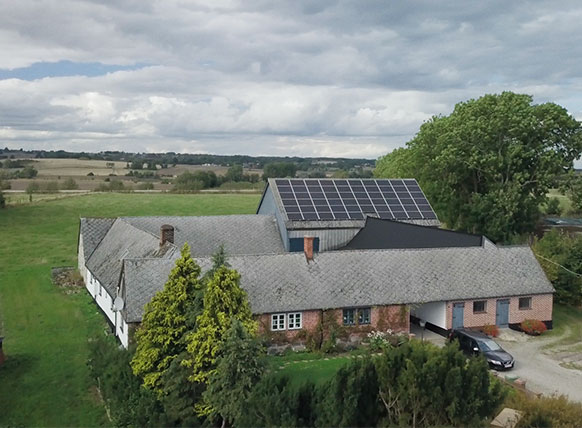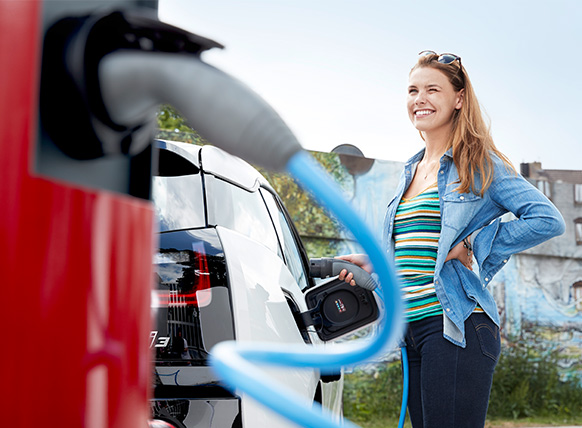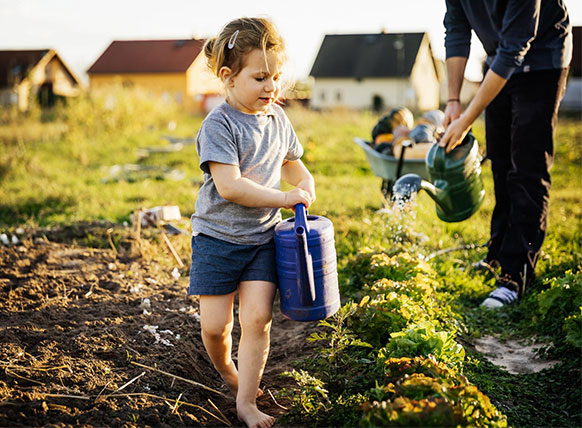

Seven ways to help protect the environment
We can’t ignore the climate crisis and the environmental damage global warming is causing1. The UK alone produced 406 million tonnes of CO2 equivalent (the measurement used for all greenhouse gas emissions rolled into one) in 2020 – 16% of which came from UK homes2. To put that into perspective, each passenger on a return flight from London to New York is responsible, on average, for roughly one tonne of carbon dioxide3.
But, together as a society, we have the answers and many of the solutions are relatively simple. So here is a list of seven things you can do to help the environment and take action for climate.


1. Generate your own renewable energy
Renewable energy is generated from infinite, natural resources such as the sun, wind and water or biomass. Renewable energy has a smaller carbon footprint than fossil fuels such as coal, oil and natural gas, the burning of which produce greenhouse gases and release harmful pollutants into the air.
You can generate your own renewable electricity at home with solar panels, using the power of the sun to provide the electricity to power your lighting and appliances. And by installing a solar battery you can store the electricity you generate to use at night or on a different day – meaning you can rely even less on the national grid to supply your electricity.
What’s more, if you’re an E.ON Next customer, you can have peace of mind that any electricity you take from the grid is backed by 100% renewable sources4.
Why not choose an eco-friendly way to heat your home too? Air source heat pumps are a sustainable heating solution that absorb heat from the air outside and use it to heat your home – working a bit like a fridge but in reverse.
Air source heat pump benefits includes being a more sustainable heating option compared to using a traditional gas boiler, oil or LPG – helping to make your home more sustainable. And you could get £5,000 off the cost of installing an air source heat pump under the Government’s Boiler Upgrade Scheme.


2. Travel responsibly
The way we choose to travel greatly impacts the UK’s greenhouse gas emissions as well as levels of air pollution. Simply choosing to walk or cycle instead of driving for short journeys can make a big difference. And for longer journeys, choose public transport where possible.
And switching to an electric vehicle instead of driving a petrol or diesel fuelled car could save the average UK household two tonnes of CO2 emissions every year5, helping to you to clear the air and help the environment.
If you’re considering going electric, or already have, then installing a home electric vehicle charger could be a great option for you. Our smart home chargers are a quick and easy way to charge your car at home – you can even charge your car overnight so it’s ready for you in the morning.
And if you generate your own renewable electricity at home, you can use this source of clean energy to charge your car.
3. Make your home more energy efficient
Ensuring the energy efficiency of our homes is essential if the UK is to meet its target of net zero emissions by 2050. Having a more energy efficient home will not only help to protect the environment but will also help to keep your energy bills as low as possible.
Insulating your walls, roof and floors is a great way to improve the energy efficiency of your home. Cavity wall insulation and loft insulation keeps the heat in for longer and prevents it from quickly escaping your home during the cold, winter months. This means that your air source heat pump or boiler doesn’t have to work as hard to heat your home. It also helps to keep your home cool during the warmer, summer months too.
Other simple steps to increase your home energy efficiency include draught proofing around your windows and doors, making sure that your light bulbs are energy efficient LEDs and ensuring that your boiler is working efficiently or replacing it with an air source heat pump.
And check if you’re eligible for extra support such as the Government’s Green Homes Grant scheme –you could get help paying for home improvements such as single-glazing window replacement and installing insulation.


4. Reduce, reuse, recycle
Reducing the amount of waste you generate is an easy way to help tackle the climate crisis and protect the planet. Make sure you know what can and can’t be recycled so you can send less waste to landfill. And before you throw anything away, consider whether it can be reused. Try to mend broken items before getting rid of them and donate unwanted items to charity.
You can easily minimise your food waste by only buying what you need and freezing anything leftover to use another day. Or why not recycle your uncooked food waste, such as fruit and vegetable peelings by putting it in a compost bin?
And choose reusable rather than single-use items where you can. For example, bring a reusable water bottle or coffee cup instead of buying plastic bottles or cups and don’t forget your reusable bags when shopping to avoid single-use plastic bags.
5. Shop sustainably
Be mindful of the products you choose to buy – opting for unpackaged fruit and vegetables and using refillable cereal and pasta containers lowers the amount of waste and plastic pollution. And there are now many plastic-free alternatives to common everyday items, like sponges, bamboo toothbrushes and sustainable food wraps.
When it comes to buying larger electrical goods, make sure you check the energy label to find out how much energy it typically uses and choose the best energy rating for your requirements, so you don’t use more energy than you need to. Why not install a smart meter to help stay in control of your energy use and track how much CO2 you generate and when?
It’s not just what you buy but also how you shop that can have an impact on your sustainability. Shopping locally often means that the products have been sourced locally too, which has a lower carbon footprint6.


6. Help local wildlife
From bees that pollinate plants to squirrels and jays that help trees spread their seeds, a biodiverse environment is key in the battle against the climate crisis.
You can help support local wildlife such as bees, birds and butterflies by choosing native plants and wildflowers or turning your garden into a wildlife corridor. You could also install a bird house or bug hotel in your garden to encourage and support local wildlife.
If you want to go a step further in creating a sustainable garden, and you have the space, planting a tree can bring many benefits to your garden and the local area. Not only do trees offer a habitat and food to many birds and insects, but they also help to remove polluting carbon from the atmosphere and reduce local air pollution7.
At E.ON, we’re planting more than 132,000 new trees across Devon with environmental charity One Tree Planted, helping to improve air quality and tackle climate change. And we’re working with the Sheffield and Rotherham Wildlife Trust to make Blackburn Meadows, the area around our biomass power plant, a haven for wildlife.
7. Other small changes to help the environment
Small changes to your daily routine can help to reduce the environmental impact of your lifestyle and protect the environment.
- Reduce your consumption of meat and dairy products (which contribute 14.5% of global greenhouse gas emissions8) and opt instead for plant-based options.
- Save water where you can as extreme weather conditions brought on by climate change are making our water supply unpredictable9. There are many ways you can use less water such as only running your washing machine or dishwasher when full, turning off taps when you’re not using them or taking short showers instead of a bath.
- Choose eco-friendly cleaning products to help reduce the amount of chemicals polluting the air and water.
- Get creative and upcycle preloved items such as furniture or clothes; not only is it often cheaper than buying new, but it helps to reduce the waste going to landfill.
Whatever steps you decide to take, by taking action for climate now, we can protect the environment and our planet for future generations to come.
Find out more about how E.ON is taking action for climate at eonenergy.com/action
1. NASA: The Effects of Climate Change
2. BEIS: 2020 UK Greenhouse Gas Emissions
3. The Guardian: How your flight emits as much CO2 as many people do in a year
4. Electricity backed by 100% renewable sources. Electricity sourced from E.ON's renewable assets, agreements with independent UK generators and the purchase of renewable electricity certificates. The electricity supplied to your home comes from the National Grid. Find out more at eonenergy.com/renewable
5. Committee on Climate Change: The fifth carbon budget
6. Gov.uk: Eight reasons to Shop Local this week to help the high street bounce back
7. The Royal Parks: Why are trees so important?
8. i: Powering the plant-based revolution
9. Energy Saving Trust: Why we should all be saving water


Our blog
Read our latest blogs to discover how E.ON is leading the energy transition through smart and sustainable solutions.


Sustainable homes
Find out the many ways in which you can create a more sustainable home and reduce your carbon footprint.


Power your home with renewable energy
Choosing renewable energy sources for your electricity and heating can make your home more sustainable. So we’ve explored the different ways you can power your home with renewable energy.
